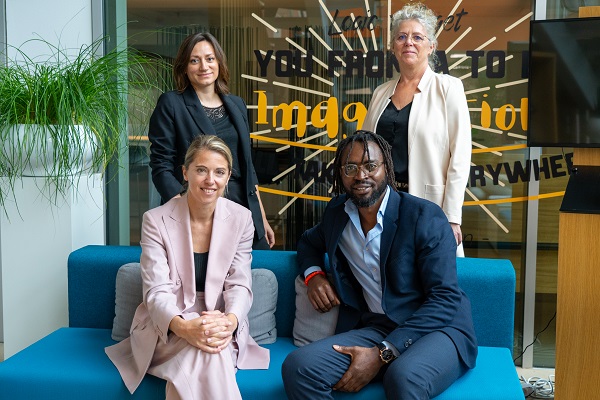 (L-R, top-bottom): Guylaine Marchi-Hanus, Business Manager at House of Entrepreneurship; Liane Felten, President of Lëtz Art; Stéphanie Damgé, Director Entrepreneurship at Luxembourg Chamber of Commerce; Uyi Nosa-Odia, Director of Lëtz Art;
Credit: C. Petit for Luxembourg Chamber of Commerce
(L-R, top-bottom): Guylaine Marchi-Hanus, Business Manager at House of Entrepreneurship; Liane Felten, President of Lëtz Art; Stéphanie Damgé, Director Entrepreneurship at Luxembourg Chamber of Commerce; Uyi Nosa-Odia, Director of Lëtz Art;
Credit: C. Petit for Luxembourg Chamber of Commerce
On Monday 23 September 2024, the Luxembourg Chamber of Commerce and the Lëtz Art association announced the signing of a collaboration agreement aimed at strengthening entrepreneurial inclusiveness in Luxembourg.
They plan to achieve this in particular through the TRICOT project, which is now pursuing some of the objectives of the former Touchpoints non-profit organisation. This project aims to raise awareness among 100-200 people per year, namely among foreign audiences who are initially less familiar with the local entrepreneurial culture.
The goal of this strategic partnership is to support potential entrepreneurs from varied migratory backgrounds. In particular, beneficiaries of international protection, but also foreigners more removed from local professional practices, can benefit from the tools and tailored support to create and develop their business in the Grand Duchy.
The Luxembourg Chamber of Commerce noted that its House of Entrepreneurship already provides a concrete response to European and international entrepreneurs, with a range of services in several languages. In 2023 alone, the House of Entrepreneurship carried out 477 regulatory consultations related to the various aspects of setting up an entrepreneurial project by non-EU nationals.
As part of this new collaboration, the Luxembourg Chamber of Commerce, through its House of Entrepreneurship, will support Lëtz Art by integrating it into its network of public partners. This support is expected to allow the non-profit organisation to organise several practical workshops intended to support around 20 to 25 migrant entrepreneurs over a year. These workshops will take place on the premises of the House of Entrepreneurship and will aim to strengthen the administrative, digital, financial and commercial skills of participants.
"This collaboration with the Chamber of Commerce and its House of Entrepreneurship allows us to broaden our scope of action and meet the specific needs of migrant entrepreneurs, who play a key role in Luxembourg's economic diversity," stated Uyi Nosa-Odia, leader of the TRICOT project for Lëtz Art.
Among the flagship actions planned by the House of Entrepreneurship starting this autumn, as part of the collaboration agreement, are inclusive pitch sessions (each on a different theme on a rotating basis, e.g. youth entrepreneurship, women, refugees), as well as the collective and individual reception of project leaders by public actors supporting business creators, called "Meet the Community". LëtzArt will participate in these formats regularly, in order to highlight the contribution of migrant entrepreneurship to Luxembourg and to meet foreign entrepreneurs.
Stéphanie Damgé, Director of the House of Entrepreneurship, added: "This initiative fits perfectly with our mission to support entrepreneurship at all levels. By collaborating with Lëtz Art, we ensure that our service offering meets the needs of a diverse entrepreneurial population."
The Luxembourg Chamber of Commerce noted that this collaboration is part of its broader vision of promoting the economic development of Luxembourg by encouraging inclusive entrepreneurship.
"By supporting initiatives such as TRICOT, we affirm our commitment to fostering a dynamic and inclusive economy, where every entrepreneur, whatever their background, can find their place," explained Carlo Thelen, Director General of the Luxembourg Chamber of Commerce.
The TRICOT project, with the expertise of Lëtz Art and the institutional support of the Luxembourg Chamber of Commerce, is described as a concrete response to the challenges faced by migrant entrepreneurs. By pooling their resources, the two organisations have committed themselves to creating an environment conducive to the emergence of new businesses, thereby contributing to the economic prosperity of Luxembourg, they concluded.








